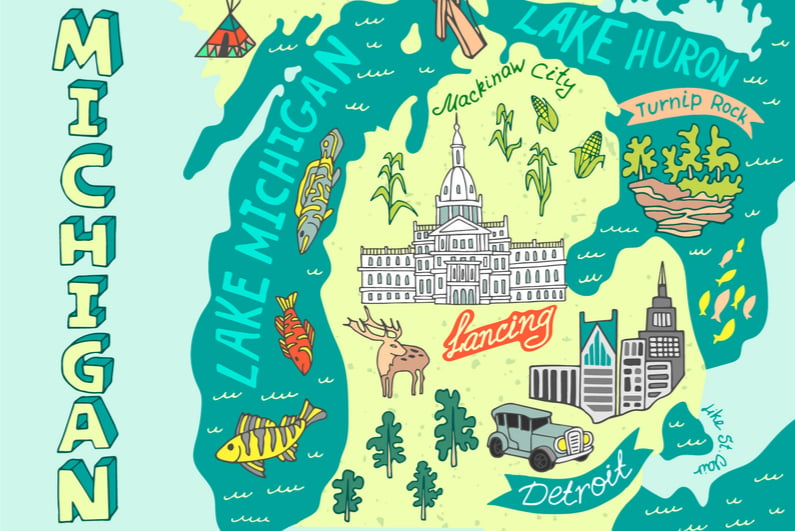A veto of online-poker legislation by outgoing Michigan Governor Rick Snyder prevents Michigan from becoming the fifth US state to to authorize and regulate the activity.
Snyder vetoed House Bill 4926, an online poker and gambling measure that would have allowed several games traditionally offered by casinos to be made available via the internet to gamblers aged 21 and up who were physically present in the state.
HB 4926 and two companion bills that would have clarified online gambling’s legal status were among 40 bills denied a signature by Snyder on his next-to-last day in office. Snyder, a Republican, was ineligible to run for re-election in November, and he will be replaced as Michigan’s top official in January by Democrat Gretchen Whitmer.
Snyder’s vetoes of HB 4926 and its companion bills stamped out a long compromise effort engineered by the bills’ primary sponsor, Michigan State Representative Brandt Iden.
Iden, also a Republican, had labored for years to bring an online-gambling bill to fruition in a state where both tribal and non-tribal casino interests wield political power and do not always share the same goals.
The final version of HB 4926 approved by the Michigan Senate last week (and then reapproved by Michigan’s House hours later by voice acclimation), removed so-called “poison pill” language that had threatened to scuttle the legalization effort before Snyder’s thumbs down accomplished the same outcome.
Online poker was the only activity specified within the legalization measures, although most other casino games were likely to have been approved under the statute’s general terms once a regulatory framework was put in place. The single exception to that would have been legalized sports betting, which has yet to be approved in any form in the state.
Snyder cites possible threat to state lottery
In a letter to the state legislature announcing the vetoes, Snyder cited concerns over a possible threat to Michigan’s existing lottery and iLottery revenue streams as a reason to kill the bills. He also cited a perceived downturn in funding of Michigan’s School Aid Fund due to a lower tax rate for online gambling.
However, Snyder’s reasoning assumed a hefty cannibalization of the state’s land-based casino revenue, when available research from other US states has shown online gambling to have no significant cannibalization effect:
Snyder wrote the following, in part, in his veto letter:
“A significant amount of work went into these bills and getting them to a place where several stakeholders either expressed support or neutrality, and I appreciate that many pro-gaming stakeholders coalesced around these bills.
“However, due to largely unknown budgetary concerns, I believe this legislation merits more careful study and comparison with how other states have, or will, authorize online gaming. To be blunt, we simply don’t have the data to support this change at this time.
“Principally, gambling behavior could shift from the State’s ILottery program to internet-based gambling at casinos. In Fiscal Year 2017, the lottery distributed $924.1 million to the School Aid Fund. For each $10 of spending on the lottery, the School Aid Fund receives approximately $2.76.
“Under HB 4926, because of its lower tax rate, each $10 in online betting translates into just four cents deposited into the School Aid Fund. Such a significant reduction, without a clearer understanding of internet gambling revenue growth potential, is concerning. Moreover, I am also concerned that revenues may be lost as gambling behavior shifts from on-premises, to online.
“Finally, I am concerned that the bills will encourage gambling by making it much easier to do so. I do not think it is appropriate to sign legislation that will effectively result in more gambling, with a reasonable chance that the state could lose revenue that could be helpful in dealing with social service issues that are ordinarily attendant to increased gambling behavior.”
2019 legislative reboot planned
Although the final, approved version of HB 4926 passed with veto-proof measures, the Michigan legislature passed the bill in its own last two days of its 2018 session. Neither the Senate nor House will reconvene, meaning that no veto override vote could occur and HB 4926 will die a technical death, leaving online gambling unapproved in Michigan.
However, Iden, who will also take over in January as the chairman of the powerful Michigan House Ways and Means Committee, through which the legislation must pass, has promised that a new edition of HB 4926 will be introduced before the end of 2019, among the first wave of the new session’s bills.
Iden, nonetheless, bemoaned the last-minute vetoes of the legalization bills. “We do have a different makeup, but we had tremendous bipartisan support from both House and Senate,” Iden told SportsHandle, about the ongoing legislative prospects.
“Frankly we have a governor, who even though she doesn’t wear the same jersey that I do, will she be interested in passing a bill that Governor Snyder vetoed? Maybe?”
